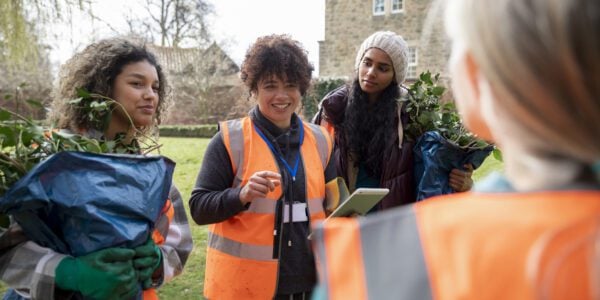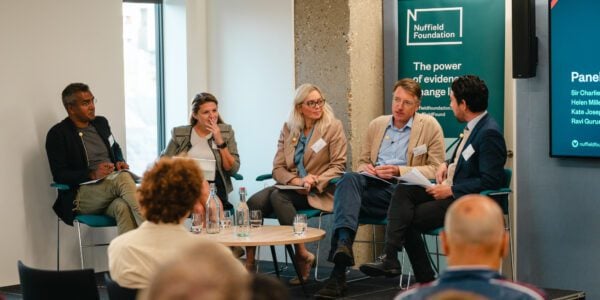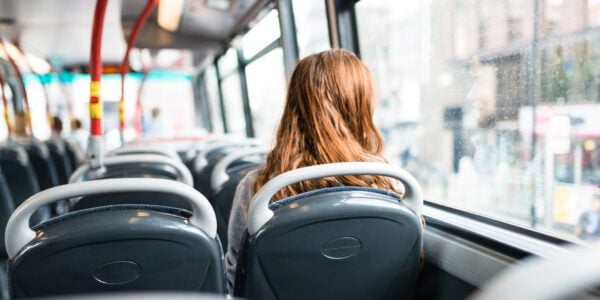
13/05/21
2 min read
All state-funded primary schools in England can now apply to receive the Nuffield Early Language Intervention (NELI) to support the language and early literacy skills of children starting school in September.
NELI is the most well-evidenced oral language programme available, providing support that is needed now more than ever, as schools report increased concern about pupils’ language and communication skills as a result of the pandemic.
The Nuffield Foundation is delivering the rollout of NELI for the 2021/22 school year, funded by an additional £8 million from the Department of Education as part of its wider catch-up programme. Participating schools will receive free training for teaching assistants and early years educators to provide individual and small-group teaching sessions over a 20-week period for pupils who need targeted language support. Two-fifths of primary schools are already using NELI and the new funding will extend the opportunity to all eligible schools that want to deliver the programme.
Schools can register online at www.teachneli.org between now and 30 July 2021. Training for staff will begin in September 2021 and schools can start delivering the programme as soon as staff have completed the training. The training has been designed by the University of Oxford and will be provided via FutureLearn.com, the leading social learning platform. Schools will also receive access to the LanguageScreen app to assess which pupils would benefit most from NELI, and physical resource packs published by Oxford University Press.
What is NELI?
NELI focuses on developing children’s vocabulary, listening and narrative skills, and in the second half of the programme, also includes activities to develop phonological awareness and early letter-sound knowledge as foundations for early literacy. Robust trials of the programme funded by the Education Endowment Foundation (EEF) show that pupils participating in NELI make, on average, at least three months of additional progress in their oral language skills, preventing them from falling further behind in acquiring the foundations of literacy.
Research suggests that this targeted language support is needed more than ever due to the impact of COVID-19 disruption on primary school starters. An ongoing study funded by the EEF found that 96% of 57 schools surveyed in the Autumn Term 2020 reported being ‘very concerned’ or ‘quite concerned’ about their pupils’ language and communication skills due to the COVID-19 pandemic. The research is being undertaken by the University of York, the Education Policy Institute, and the National Institute of Economic and Social Research.
The disruption to early education caused by the pandemic is far from over, with nursery attendance remaining lower than usual and opportunities for pre-school children to develop their language skills significantly reduced by restrictions on social interaction. Rigorous evaluations have proven that NELI helps children, including those from disadvantaged backgrounds and those with English as an additional language, to accelerate their language development and early literacy skills. We would encourage all schools who have not yet done so to register to receive the free training and resources to deliver this successful programme.Josh Hillman, Director of Education
We know the first years of a child’s life can be the most formative, which is why this Government is making it a priority to make sure all children have the best start in life. Speaking and communicating with confidence sets a child up for success in life, so it’s vital that we support children to grow in confidence with these skills – especially those for whom English is not their first language or who have been more isolated during the pandemic than their peers. The early results from the Nuffield Early Language Intervention are very encouraging and I encourage every school with a Reception class to sign up in this second phase.Children and Families Minister Vicky Ford
By electing to take part in the NELI programme we recognised the need to take a ‘bottom up’ approach in order improve speaking and listening skills, which in the long run increases children’s progress and attainment across the curriculum. This programme complements, and is layered on top of, our wide curriculum offer, which includes elements of Talk for Writing. We are very proud of our child-led curriculum here. Eleven children were highlighted in the NELI screening process, which was easily accessed online. We run two groups three times each week, alongside additional one-to-one sessions. We’ve also invested time and made NELI a key priority. This commitment has yielded great results, even prior to the midway point being reached. A further outcome has been improved behaviour, as the children become less frustrated socially and can communicate their wants and needs. The online training for staff was engaging and Ted [the puppet used in NELI training] is a favourite with the children.Angela Filsell, Headteacher of All Saints’ Church of England Primary School































